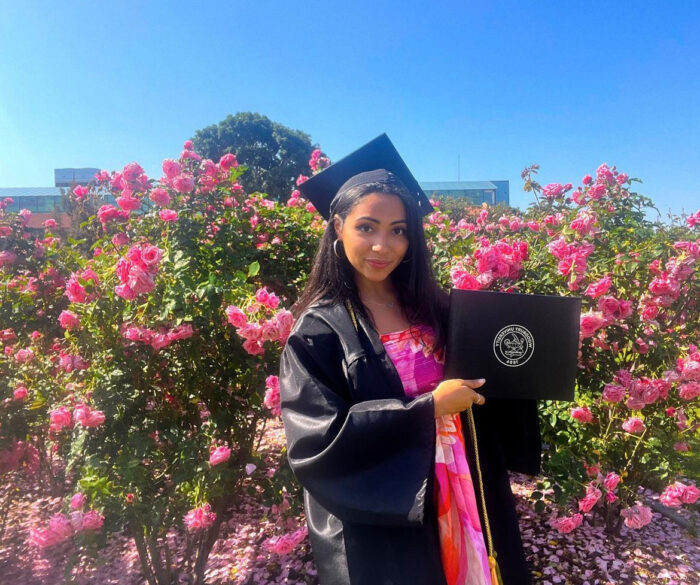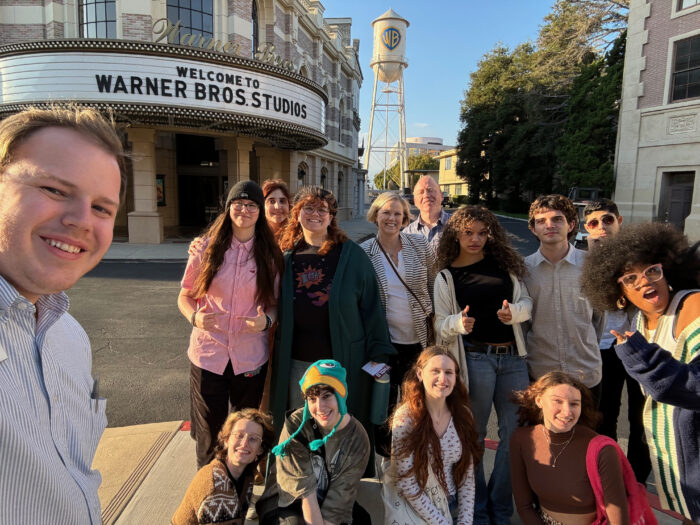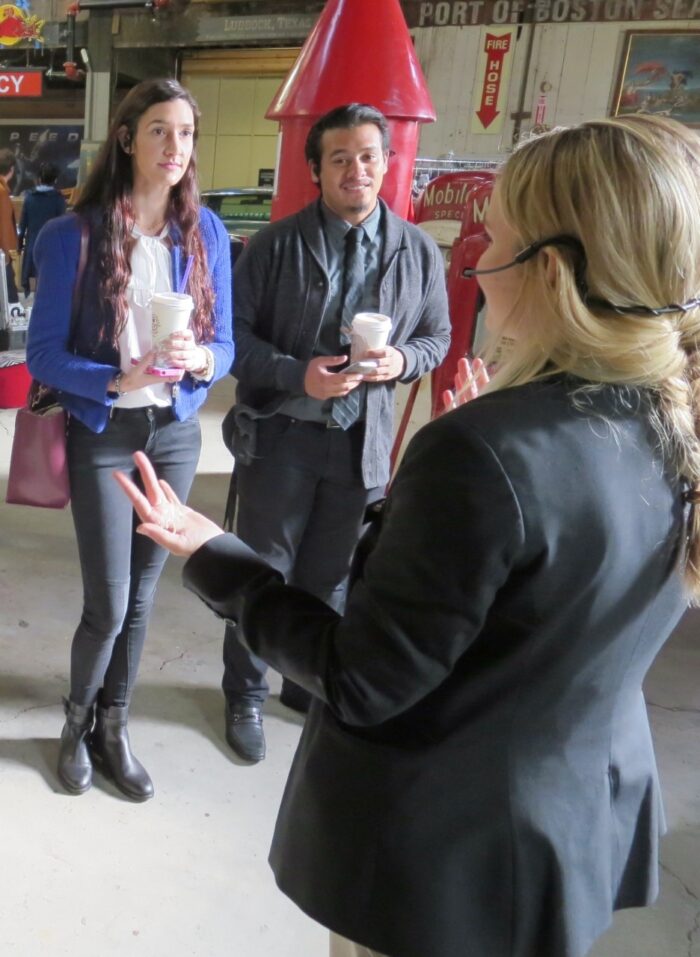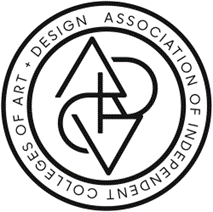School of Media : Culture : Design
Filmmaking, BFA
Bachelor of Fine Arts (BFA) [STEM Program]
Woodbury’s Bachelor of Fine Arts (BFA) in Filmmaking is a professional degree that prepares graduates for production careers in film, television, and media. Students learn narrative filmmaking through a comprehensive curriculum including film production, screenwriting, cinematography, directing, producing, and film marketing and distribution. The working industry today values students with a variety of skills. Woodbury’s location, within just a few miles of many major entertainment studios, provides students with a host of industry resources and connections.
Get a 360-degree view of our Sound Stage
Get a 360-degree view of our Screening Room
Apply Request Information Take a TourCreate your Future
Woodbury’s Filmmaking program empowers students to hone their critical, creative, and professional talents by advancing knowledge in the history, industry, and practice of film production. At Woodbury, we cultivate a collaborative environment where students can develop their stories, express their ideas, and master the new technologies that will help them succeed in the entertainment industry.
The BFA in Filmmaking provides an intensive experience in practical filmmaking. Students work with filmmaking equipment immediately and learn as active filmmakers. Throughout the program, students study films in our screening room, shoot on our soundstage and campus, and edit productions in our film labs. We also expose students to the working Hollywood industry through coursework and a required internship in the media industry. Every student is given the opportunity to write, produce, direct, and edit their own thesis film.
Our program’s emphasis on film as both an artform and an industry is well-aligned with our advantageous location in Burbank, just a few miles from many of the major studios. This means that our students learn from faculty who are both scholars and industry practitioners, and that our students have ample opportunity to take advantage of local resources, develop industry connections, and find nearby employment when they graduate.
Interested in Learning About our BA in Filmmaking?
Our two filmmaking programs emphasize film as both an art form (BFA) and an industry (BA) with ample opportunity to take advantage of local resources, develop industry connections, and find nearby employment when they graduate.
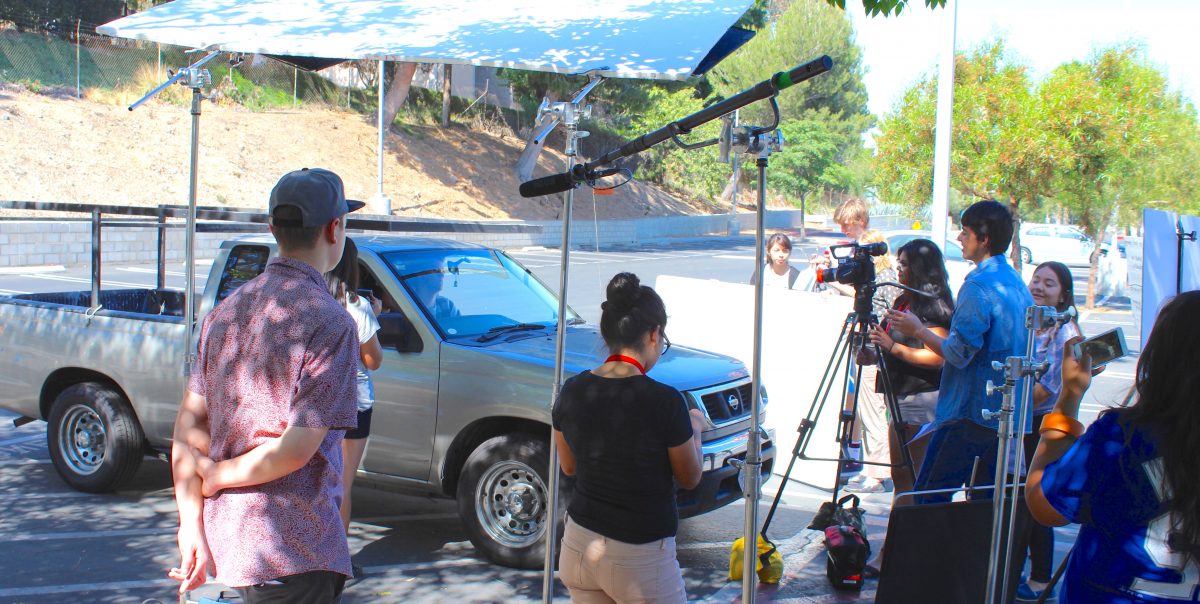
Internships & Careers
Student internships:
- Bravo TV
- Di Bonaventura Pictures
- Hulu
- The Jim Henson Company
- NBCUniversal
- Netflix
- Pricetone Recording Studios
- Roddenberry Entertainment
- Roadside Attractions
- SkyDance Media
- Sony Pictures
- United Talent Agency
- Warner Bros.
*Internships are a required component of the BFA degree in Filmmaking.
Career opportunities:
- Agency/Management
- Casting
- Cinematography
- Commercial production
- Development
- Digital content creation
- Directing film/TV
- Editing
- Line producing
- Producing film/TV
- Post-production
- Sound recording and design
- Writing film/TV
Our Grads have gone on to careers at:
- Amazon Studios
- Chuck Lorre Productions
- The CW Network
- Dick Wolf Productions
- Disney
- The Gersh Agency
- Inspire Entertainment
- Legendary Entertainment
- NCIS
- Nickelodeon
- Paramount Pictures
- RBEL Agency
- Westworld
Filmmaking (BFA) Courses
The curriculum is designed in a progressive sequence allowing students to build knowledge and skills as they journey through their film major. They begin with production classes in their first semester, followed by courses in cinematography, writing, sound, and editing. The students then create their thesis films in specifically designed courses in writing, pre-production, production and post-production. The program culminates in courses that address the business side of entertainment: marketing, producing, and career development. Through this comprehensive curriculum, students are instilled with a sense of entrepreneurship and collaboration.
FILM 110: Film Production 1
3 UNITS
This course is an introductory hands-on media production course that provides solid grounding in the technical and creative aspects of production and post-production. Students will conceptualize and develop solo and group video projects and become familiar with screenwriting and digital non-linear editing techniques. Studio. Prerequisite: None.
FILM 115: Cinematography
3 UNITS
This course is designed to introduce students to the basics of cinematography. In this class, we will cover the basic understanding and operations of camera, grip, and lighting equipment. Terminology, set procedures, aesthetics, and analysis will be a daily part of the class. Students will be required to attend, actively participate, and complete assignments in class as well as outside of class as an individual or in small groups. Studio. Prerequisites: FILM 110, Film Production 1.
FILM 140: Sound
3 UNITS
Throughout the semester, students will be required to record sound from the production process and carry it through post-production. Through theory and exercises, students will learn how to capture production sound utilizing different microphones and capture devices, as well as the basic techniques used by sound professionals. In the post-production process, the sound files will be managed, synced, manipulated, and recreated using Adobe Premiere. The basics of sound mixing and sound design will create an understanding of how sound enhances the immersive experience of film. Studio. Prerequisite: FILM 110, Film Production 1.
FILM 200: Screenwriting
3 UNITS
This course explores the process of writing a narrative script through lectures, screenings, readings, in-class writing exercises, in-class workshops, and, of course, a lot of out-of-class writing. Students develop an idea into both a detailed treatment and a short film script. Class emphasis is on the student’s own work, as well as on the development of the technique and craft
necessary to shape that work. Students will learn Final Draft and study the leading screenwriting gurus of the day. Lecture. Prerequisite: WRIT 111, Academic Writing I. Open to all majors.
FILM 203: Acting
3 UNITS
This studio course introduces the students to the basic principles and skills required for the art of acting. By exploring physical, emotional, and psychological techniques that encourage unique and specific character development, the student will learn how to apply these essential skills to filmed scene work. The student will also process how an actor primarily works as a storyteller, which informs the choices he/she, along with the director, must make. Studio. Prerequisite: None.
FILM 210: Film Production 2
3 UNITS
This course is designed to assist the student’s growth in visual storytelling. Focusing on the short film, this class will explore characters, story arcs, acts, style, and more. This workshop class will provide students with in-class time to create films. The course will also require that they work outside of class to finish assignments or projects. While discussing the broad terms of storytelling, the class will demand that students collaborate with others to find the best idea to suit the needs of each story that they will craft. This will require time and effort, respect for the process, and strong participation. The course will also demand that students offer suggestions and receive and give criticism of the work. In this class, students will write, produce, direct, edit, and complete 4 to 5 projects. Studio. Prerequisites: FILM 110, Film Production 1 and FILM 115, Cinematography 1.
FILM 215: Directing
3 UNITS
The core of this course explores the collaborative process between the director and actors, the communication between them, and the shaping of actors’ performances. Students will choose scenes from the class-assigned script, hold auditions, cast, rehearse, and present those scenes in class. This is a workshop-style class that will require students to direct assigned scenes, share critiques, and receive direct feedback. 3 units. Studio. Prerequisite: FILM 110, Film Production 1.
FILM 300 Thesis Screenwriting
3 UNITS
During this intensive 15-week class, students will discover how premise and character development work together to create compelling drama. The students will pick their story and begin writing their own short scripts, which will be developed, presented, discussed, and rewritten from a director’s point of view, preparing students to direct the script themselves. We will also talk about genre, style, tone, and music, as these are crucial tools for a writer/director. At the end of the semester, the students will have their own short scripts ready for them to direct for their Thesis Project. Lecture. Prerequisite: FILM 210, Film Production 2,
FILM 304 Thesis Pre-Production
3 UNITS
Students learn the fundamentals of film production and to create professional-quality portfolio work by utilizing pre-production and marketing skills. In this course, students will work on budgeting, scheduling using industry software, and creating fundraising business plans. This class also involves hands-on production of pitch videos, as well as editing to prepare to shoot senior thesis production projects the following semester. Lecture. Prerequisites: FILM 300, Thesis Screenwriting.
FILM 310 Documentary Film Production
3 UNITS
This course will focus on the ways documentaries both report on and influence culture, looking at the specific processes of persuasion. A variety of theoretical perspectives will be used to untangle the meanings inherent in texts presented as entertainment so that their complexities and cultural logic becomes visible and subject to critique. Students will consider how such documentaries have influenced their own lives and those of others through the mechanisms of popular culture. They will also conduct a series of projects culminating in their own short documentary. Studio. Prerequisite: FILM 110, Film Production 1.
FILM 480 Thesis Production
5 UNITS
This course explores advanced practical and conceptual low-budget indie filmmaking in physical production. Students shoot scripts written during FILM 300, Thesis Screenwriting, and planned in FILM 304, Thesis Pre-Production. Double-system production sound will be recorded. This begins the Senior Film, which is meant to serve as a portfolio piece and is a graduation requirement. Studio. Prerequisites: FILM 304, Thesis Pre-production.
FILM 220 Editing
3 UNITS
Editing is an essential part of the filmmaking process and students will gain an understanding of the principles and techniques that an editor uses to tell a story, along with the technical aspects related to the editing process and post-production. Lecture. Prerequisite: FILM 110, Film Production 1.
FILM 481 Thesis Post-production
4 UNITS
This course explores the advanced practical and conceptual low-budget indie filmmaking post-production process from editing, titles, visual effects, mixing, and distribution to festivals. This concludes the Senior Thesis Project, which is meant to serve as a portfolio piece and is a graduation requirement. 3 units. Studio. Prerequisite: FILM 480, Thesis Production.
FILM 1__: Intro to Film Art & Style
3 units
Prerequisites: none
Films can be understood from a number of perspectives: as technology, as business, as entertainment, as art, and as a socio-cultural artifact that reflects the cultural conditions under which they are produced and received. This course emphasizes the study of film form and style by exploring topics such as narrative, mise-en-scène, visual and sound design, genre, and authorship. The goal of this course is to provide students with a set of basic tools for understanding and communicating how film form relates to meaning. Lecture.
FILM 101: Film History I
3 units
Prerequisites: none
This course examines the technological, social, cultural, and aesthetic dimensions of cinema and the moving image from its inception through the 1940s. Lectures, screenings, readings, and discussions will explore the formal diversity of international cinema and investigate the impact of the global circulation of films, filmmakers, and film culture. Lab.
FILM 102: Film History II
3 units
Prerequisites: none
This course covers the period from 1950 to the present. Through lectures, discussions, and analyses of screenings of films and film clips, this course will offer a chronology of the development of both the artistic elements in the narrative motion picture—exploring the film story as a natural progression of the storytelling tradition that has shaped scripture, poetry, drama, and the novel throughout human history—and as a globe-spanning business that has reshaped our perceptions of cultures, ethnic groups, and economic systems. Lab.
MDST 237: Media and Identity
3 units
Prerequisites: WRIT 113, First-Year Academic Writing
This course examines the relationship between mediated forms of communication and the formation of individual and social identities, with a particular emphasis on identities related to race, class, gender, ethnicity, and sexuality. Through a combination of lecture, screenings, and discussion, students will examine the ways in which popular media serves to construct, maintain, reproduce and/or challenge the patterns of representation that shape our social and cultural understanding of identity. Lecture.
MDST 241: Media Industries
3 units
Prerequisites: none
At the core of the media industries is a fundamental tension between art and commerce; creative products are generated within a business environment that is focused on keeping costs down and profits high. This course will introduce students to the institutional, economic, technological, and regulatory factors that shape the circulation of cultural objects within the entertainment media industries. Through a combination of lecture and discussion, students will come to understand the media industries’ key players, challenges, hierarchies, and debates. Lecture.
FILM 401 Entertainment Marketing
3 UNITS
Open to all majors, this course will examine film and television product acquisition, distribution, and exhibition. This is an introductory course for those interested in pursuing careers as producers, directors, marketing executives, media-planning executives, and filmmakers developing marketing for media projects. This class examines the business issues associated with the distribution, marketing, and exhibition in the film and television entertainment industry. Lecture.
FILM 402 Producing
3 UNITS
This class will explore what it takes to be a producer. The producer is the first one on and the last one off the project. The course will cover how to find material, how to option it, how to attach talent to your project, how to pitch it, and how to find places to do so. This class is designed to give the student the confidence needed to move forward into the world of producing. Lecture.
FILM 490 Career Experience
3 UNITS
Students participate in an on-the-job practicum in commercial settings in media, design, entertainment, and marketing firms. Work experience is complemented by academic requirements specified in a contract with the faculty advisor. Prerequisite: Filmmaking majors.
University accredited by:
NASAD: National Association of Schools of Art & Design
WSCUC: Senior College and University Commission (formerly WASC)
